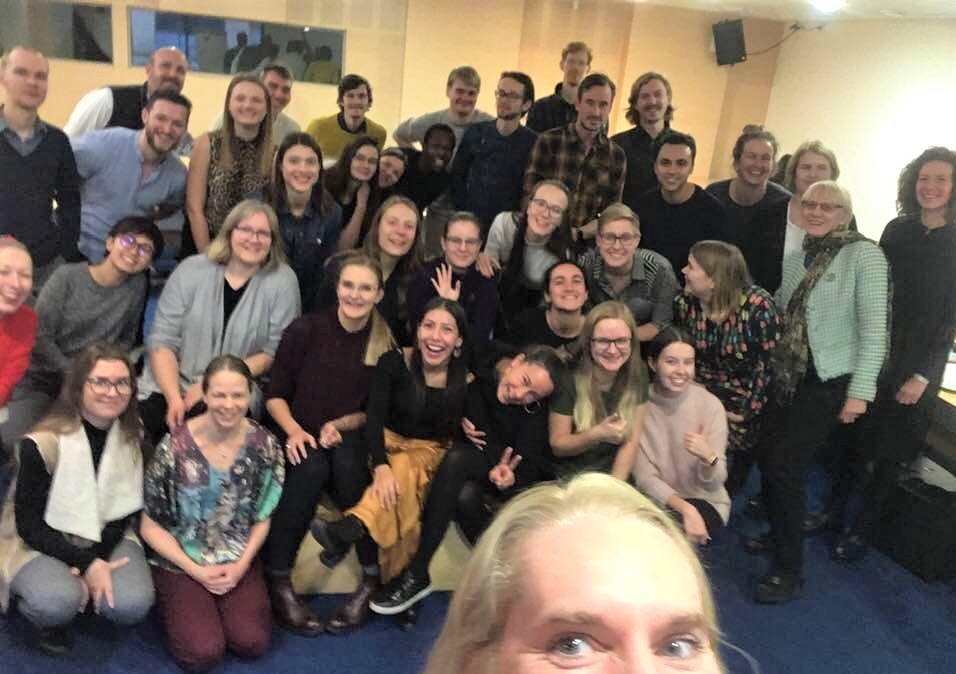Sustainable Cities Masters School Course Researched Mustamäe
In the beginning of November twenty five participants from the Nordic-Baltic countries attended NORDPLUS masters school "Sustainable cities in the Nordic-Baltic Region". For four-days course participants from 17 different countries including Iceland, Mexico, Ghana, Argentina, Australia, Malaysia, U.S, Canada, Vietnam, Moldova etc discussed the issues of resilience, socio-ecological systems and community building. The themes of this year were mobility, well-being and seasonality.

Sustainable Cities in the Nordic-Baltic Region brings together talented master-level and PhD students studying urban planning, architecture, landscape-architecture, geography, natural sciences, social sciences and so on every autumn to an innovative and multidisciplinary four-day intensive course around sustainable urban planning.
Geoinformatics for Urbanised Society student Kingsley Koranteng from University of Tartu commented that he was interested in sustainable urban planning and this course gave the opportunity to learn more about it. “I think about the future. Everything what I learn here I could apply in my home country Ghana,” said Koranteng.
Not Only for Masters Students
In this course the PhD students developed skills in mentoring Masters students and in leading multidisciplinary and international teams. Many PhD students coordinated and combined different skills to teach and guide.
The participants shared ideas and worked together as a multidisciplinary and international team on a real-life planning case located in one of Tallinn’s administrative districts Mustamäe. urbanisation is a problem that we face all over the world, in every single city so we need to reevaluate and start planning sustainable cities. One of the issues that Mustamäe residence have is lack of parking spaces do to the car ownership has increased immensely in the past 30 years and better use of greenspace. PhD student at the Stockholm Resilience centre (Stockholm University) Niak Sian Koh explained, “During our excursion to Mustamäe, we were pleasantly surprised with how much green space they have with the surrounding forests.” She also pointed out, “Although, the way the greenspaces are used within courtyards is limited. There was not much diversity in terms of different tree species, shrubs, and flowerbeds, which means there is little pollination opportunities. The residents use the courtyard area mostly to walk through. There is potential to improve both the wellbeing of the resident and biodiversitys.”
Exchanging Experience and Teamwork
The purpose of the course was to enhance the knowledge and skills of the students in the field by giving them a chance to work with a multidisciplinary, collaborative and international approach to urban development. Research team leader from Stockholm Resilience Centre (Stockholm University) Erik Andersson said, “Intensive four-day course is quite challenging. We hope that the participants will bring with them a different way of thinking about sustainability. The course requires actual case work and team effort and understanding each other and hopefully be an eye opener of what is possible and realistic.”
The course will be arranged every autumn during 2019-2021, each time in a different Nordic or Baltic city. The course aim is interaction and close networks between students and other actors within sustainable urban development in the Nordic-Baltic countries.
Some starting steps that we can do as individuals for sustainability
- Realization that we are part of our city and our well-being in it. We are not passing urban space, we are living in it. We need to use platforms, where people can meet and help each other.
- On a global level the food we eat and the energy we use should be the two biggest sustainability thoughts in our minds. Choices how we travel, what we eat and where that comes from.
- Clear understanding who we vote for. Political engagement one of the ways how we can act towards sustainability.
Course in Estonia was organized by "Human-nature interactions in the city: establishing an "environmental behavior" research group and network at the University of Tallinn" research group. More about the course.
